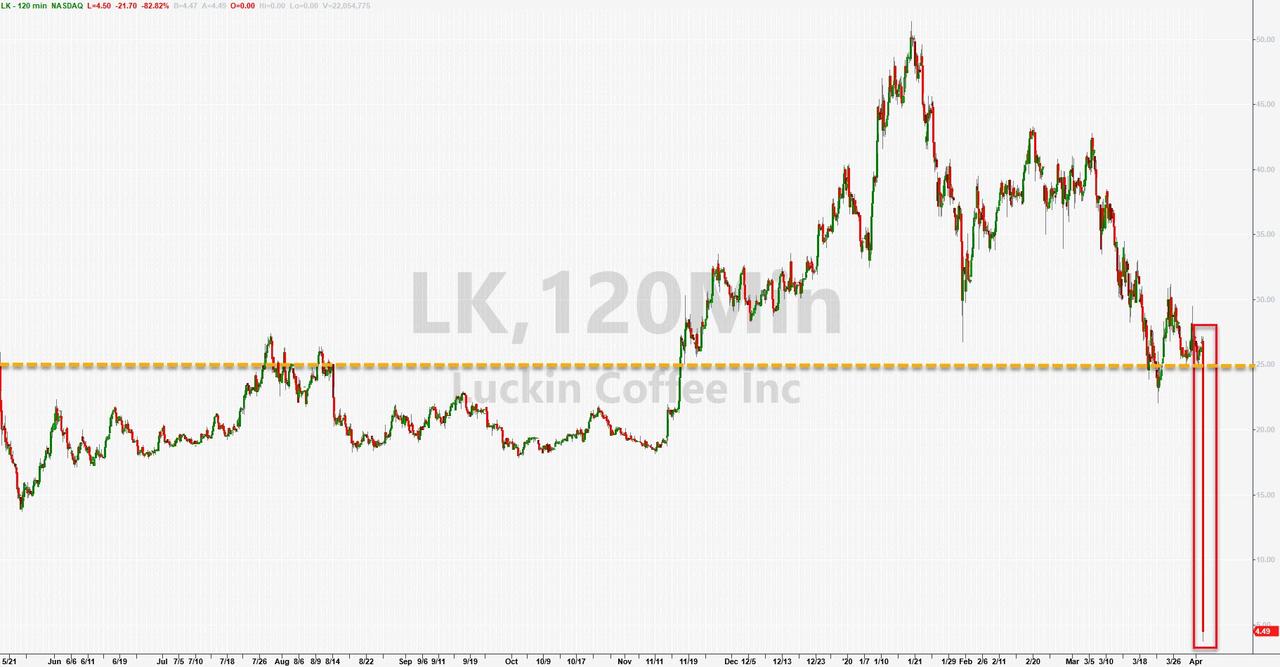“When The Tide Rolls Out”: Jim Chanos Delivers CNBC Master-Class In Shorting Stocks
Jim Chanos had a good start to the day today.
Hours before his appearance on CNBC, where he weighed in on a number of topics, he had already covered his short on Luckin Coffee. Recall, we reported this morning that Luckin Coffee was smashed 85% after it admitted to inflating its sales to the tune of RMB 2.2 billion after an internal investigation.
Luckin Coffee said its special committee today brought to the attention of the board information indicating that COO Jian Liu and several employees engaged in certain misconduct, including fabricating certain transactions, starting 2Q last year.
The market reaction was so fierce, Chanos said he covered his position in the pre-market session, where the stock was trading as low as with a $3 handle. It finished trading on Thursday at $6.40.
Chanos credited his “luck” to fellow short seller Muddy Waters and Carson Block. “We were short thanks to Muddy Waters, who urged me to take a look at it back in February,” Chanos told CNBC.
Chanos used Luckin’ as an example of why short selling is valuable, telling Scott Wapner:
“Luckin’s a great example of — when people talk about banning short selling or restricting short selling. This stock was being talked about by the fundamental short sellers in the community in January and February as a fraud. It’s one of the things that short-sellers do: They’re the real-time financial detectives.”
He also used it as an example of why people should continue to avoid Chinese companies. “We saw it this morning with Luckin: You have to avoid these Chinese companies like the plague,” Chanos said. “How many times do investors have to be burned in these companies that are just too good to be true? Growing 40% to 50% a year, with all kinds of odd transactions with affiliates.”
Chanos also warned about “virus stocks”.
The short seller said on CNBC’s Halftime Report:
“One area I would warn people about for example is the virus stocks. They are doing well right now in this enforced lockdown. A lot of these companies are really not structurally growth stocks that are trading at 30, 40, 50 times earnings because they are going to do well in the first and second quarters of 2020.”
He continued: “Of course when the virus subsides, and we all know it will, those companies will probably begin to not look as attractive going forward. I would tell your viewers to be very, very careful about just piling into things that are doing well because people are inside and will stay inside for the next three, four, five weeks.”
Among the names he warned about were Zoom Video, Teladoc, Peloton and Clorox. Shares of Zoom Video and Teladoc are up 85% and 94%, respectively, this year.
“Look at the business and look at 2019. Take an educated guess, do your research and do your work and what you think this looks like in 2021. If it’s still a cheap stock then, then it might be an attractive investment on the long side.”
Chanos also took exception to “gig economy” stocks.
He said, on the same network where contributor Joshua Brown “doubled” his position in Uber on February 7, that gig economy companies like Uber would wind up “harmed” from the coronavirus.
“I think the gig economy companies are going to come out of this harmed, not enhanced,” he said.
“I know there’s a body of thought that oh, well everybody will just do food delivery and we’ll all take Ubers and no one is going to buy a car again, and I think the flip side of it is that the labor pool issue for the gig economy companies is going to loom very very large coming out of this crisis.”
Chanos also admitted to being short several restaurant names, like Wendy’s and Restaurant Brands.
“Some of the franchisees may not make it,” he said. Chanos also told Wapner that he had covered shorts in a lot of energy names to begin the week.
Chanos also said he thinks the political landscape around many corporations will have shifted after the pandemic.
“I think both political parties are going to be looking at that pretty hard coming out of the crisis to enhance corporate responsibility in lots of different ways whether it’s keeping employees as independent contractors, whether its restricting buybacks,” Chanos concluded.
Tyler Durden
Thu, 04/02/2020 – 18:25
via ZeroHedge News https://ift.tt/343rlrR Tyler Durden
